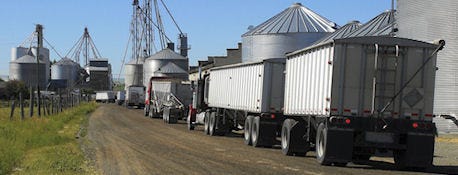
The Minnesota Grain and Feed Association recently reported that a member elevator had the misfortune of encountering treated soybean seed in a 10,000-bushel grain bin, which caused a marketing headache for the elevator as it tried to find a buyer to accept the contaminated grain.
Apparently, the producer in this case was unable to work with his seed supplier on a plan to dispose of the leftover treated seed.
More than 70% of the soybeans planted, or that were intended to be planted, in Minnesota were treated with a fungicide, requiring extra care by farmers to keep seed soybeans separate from harvested soybeans headed to market, said Bob Zelenka, MGFA executive director.

Don't Ship Treated Seed
"Both federal law and the U.S. Grain Standards Act allow ZERO tolerance for treated soybean or corn seed at market, which includes ethanol and biodiesel markets as well," Zelenka said. "A single colored treated seed can contaminate a grain bin, truck or railcar."
Zelenka said that elevators are left with little recourse when treated seed is found.
"We could hold a farmer legally responsible for the contamination if we are able to identify the producer who started the problem with a few treated seeds mixed in the grain," he said.
"Mixing treated and untreated soybeans or corn can cause a trail of contamination stretching from the farm through domestic elevators and ending with a rejected shipment and a damaged reputation for soybeans and corn grown in the U.S," Zelenka added. "Fungicides have a place in seed beds, not on a dinner plate!"
MGFA told its member elevators in a recent newsletter that they need to be vigilant this fall, especially since some areas of the state experiencing planting challenges last spring.
"It is important for you to be aware of the possibility of receiving some corn or soybean seed mixed in with a load being delivered to your elevator," the newsletter said. It reminded elevators to draw representative samples of inbound grain and to check the sample before binning.
"We can only hope that this incident was isolated and that [farmers will] understand the magnitude of this potential problem," he said.
About the Author(s)
You May Also Like






